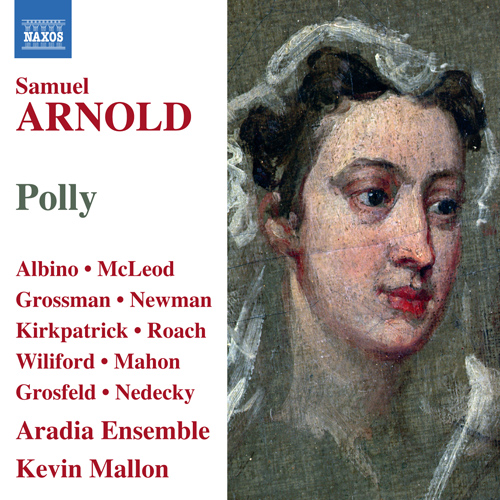ARNOLD, S.: Polly (Albino, McLeod, Grossman, Newman, Aradia Ensemble, Mallon)
Pepusch’s ballad opera Polly, composed in 1729 to John Gay’s libretto as a sequel to their highly successful The Beggar’s Opera (1728), never reached the stage owing to government censorship. In 1777, Samuel Arnold completely renovated the score, which established his reputation as London’s preeminent theatre composer. With its melodramatic tale reuniting Polly Peachum and Macheath in the West Indies and ending in Polly’s marriage to the ‘Indian prince’ Cawwawkee, this ‘island paradise’ opera was a huge hit and remains enormously entertaining today.
Tracklist
Arnold, Samuel
Gay, John - Lyricist
Mallon, Kevin (Conductor)
Nedecky, Jason (baritone)
Kirkpatrick, Loralie (mezzo-soprano)
Albino, Laura (soprano)
McLeod, Eve Rachel (soprano)
Grossman, Gillian (soprano)
Mahon, Andrew (baritone)
Grosfeld, Matthew (bass)
Newman, Marion (mezzo-soprano)
Roach, Bud (tenor)
Wiliford, Lawrence (tenor)
Mallon, Kevin (Conductor)
Aradia Ensemble (Ensemble)
Mallon, Kevin (Conductor)
Aradia Ensemble (Ensemble)
Mallon, Kevin (Conductor)
Aradia Ensemble (Ensemble)
Mallon, Kevin (Conductor)
Aradia Ensemble (Ensemble)
Mallon, Kevin (Conductor)
Aradia Ensemble (Ensemble)
Mallon, Kevin (Conductor)
Aradia Ensemble (Ensemble)
Mallon, Kevin (Conductor)
Nedecky, Jason (baritone)
Aradia Ensemble (Ensemble)
Mallon, Kevin (Conductor)
Aradia Ensemble (Ensemble)
Mallon, Kevin (Conductor)
Aradia Ensemble (Ensemble)
Mallon, Kevin (Conductor)
Nedecky, Jason (baritone)
Mallon, Kevin (Conductor)
Aradia Ensemble (Ensemble)
Nedecky, Jason (baritone)
Aradia Ensemble (Ensemble)
Mallon, Kevin (Conductor)
Aradia Ensemble (Ensemble)
Mallon, Kevin (Conductor)
Aradia Ensemble (Ensemble)
Mallon, Kevin (Conductor)
Aradia Ensemble (Ensemble)
Mallon, Kevin (Conductor)
Mallon, Kevin (Conductor)
Mallon, Kevin (Conductor)
Mallon, Kevin (Conductor)
Mallon, Kevin (Conductor)
Mallon, Kevin (Conductor)
Aradia Ensemble (Ensemble)
Mallon, Kevin (Conductor)
Mallon, Kevin (Conductor)
Aradia Ensemble (Ensemble)
Mallon, Kevin (Conductor)
Aradia Ensemble (Ensemble)
Mallon, Kevin (Conductor)
Grosfeld, Matthew (bass)
Aradia Ensemble (Ensemble)
Mallon, Kevin (Conductor)
Aradia Ensemble (Ensemble)
Mallon, Kevin (Conductor)
Aradia Ensemble (Ensemble)
Mallon, Kevin (Conductor)
Aradia Ensemble (Ensemble)
Mallon, Kevin (Conductor)
Aradia Ensemble (Ensemble)
Mallon, Kevin (Conductor)
Aradia Ensemble (Ensemble)
Mallon, Kevin (Conductor)
Newman, Marion (mezzo-soprano)
Aradia Ensemble (Ensemble)
Mallon, Kevin (Conductor)
Aradia Ensemble (Ensemble)
Mallon, Kevin (Conductor)
Aradia Ensemble (Ensemble)
Mallon, Kevin (Conductor)
Newman, Marion (mezzo-soprano)
Mallon, Kevin (Conductor)
Aradia Ensemble (Ensemble)
Mallon, Kevin (Conductor)
Aradia Ensemble (Ensemble)
Mallon, Kevin (Conductor)
Aradia Ensemble (Ensemble)
Mallon, Kevin (Conductor)
Aradia Ensemble (Ensemble)
Mallon, Kevin (Conductor)
Aradia Ensemble (Ensemble)
Mallon, Kevin (Conductor)
Aradia Ensemble (Ensemble)
Mallon, Kevin (Conductor)
Aradia Ensemble (Ensemble)
Mallon, Kevin (Conductor)
Mallon, Kevin (Conductor)
Mallon, Kevin (Conductor)
Mallon, Kevin (Conductor)
Mallon, Kevin (Conductor)
Mallon, Kevin (Conductor)
Mallon, Kevin (Conductor)
Albino, Laura (soprano)
Grossman, Gillian (soprano)
Roach, Bud (tenor)
Mallon, Kevin (Conductor)
Nedecky, Jason (baritone)
Mallon, Kevin (Conductor)
Nedecky, Jason (baritone)
Mallon, Kevin (Conductor)
Albino, Laura (soprano)
Roach, Bud (tenor)

Irish/Canadian conductor Kevin Mallon studied composition with Peter Maxwell Davies and conducting with John Eliot Gardiner alongside singing and Baroque violin.
He served as concertmaster with Le Concert Spirituel and Les Arts Florissants in Paris before moving to Canada to take up posts with Tafelmusik Baroque Orchestra and the University of Toronto.
In 1999 he founded the Aradia Ensemble, with whom he has toured widely and has made over 50 recordings for Naxos.
In Ireland, he was appointed Artistic Director of Opera 2005, formed to celebrate Cork’s tenure as European Capital of Culture.
In 2009 he began working with Odessa Opera, Ukraine, conducting productions in Odessa before touring across Holland, Belgium and Spain.
Mallon is Music Director of Thirteen Strings Chamber Orchestra in Ottawa and has recently been appointed Artistic Director of Symphony in the Barn in Ontario.
For more information, visit www.kevinmallonmusic.ca.
The son of a certain Thomas Arnold and, reputedly, of Princess Amelia Sophia (a pupil of Handel), Samuel Arnold was taught in London by a pupil of the composer Blow. He made an early reputation as an organist and from 1764 onwards was actively involved in the London theatre both as a keyboard player and as a composer. He was also able to take on the position of organist and composer to the Chapel Royal from 1783, and 10 years later of organist at Westminster Abbey. In 1795 he appeared with Haydn in the concerts staged by Salomon.
Stage Works
Arnold wrote a very large quantity of music for the theatre, including pasticcios, ballad operas and English comic operas. His incidental music includes derivative contributions to performances of Shakespeare’s Macbeth, staged at the Haymarket Theatre in 1778. Polly, a sequel to Gay’s The Beggar’s Opera, finds the heroine in the West Indies. It is introduced by an overture that makes use of tunes from the earlier work. Arnold’s three-movement Overtures, Op. 8 were written for the entertainment of visitors to Marylebone Gardens.
Born in Berlin, Pepusch had an early association with the Prussian court as a musician. He moved to London in 1697, reportedly after seeing the execution of a Prussian officer, without trial, for insubordination. In London he first wrote music for an ensemble directed by his brother Gottfried, and he became increasingly involved with the theatre, both as a player and as a composer. He won respect as a scholar and teacher, and in 1713 he was awarded a doctorate by Oxford University. The same period of his life found him employed by the Duke of Chandos, where he was later followed by Handel.
Vocal and Instrumental Music
The name of Pepusch is inevitably associated with the very successful The Beggar’s Opera of 1728, for which he probably provided an overture and the bass lines of its popular melodies. His compositions, however, included much more than this, with works for the theatre and the church, a large number of instrumental sonatas—a hundred of them for violin, and collections of secular English cantatas.































